|
|
|
|
|
|
|
Goodell-Pratt Company - Greenfield, MA
|
|
|
|
|
|
|
|
|
Goodell Brothers - the
Bedrock of Goodell-Pratt Co.
by Wiktor Kuc |
 15 of 19
15 of 19
 |
|
|
Albert D. Goodell and Goodell Tool Company
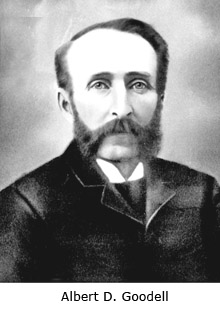 Albert D. Goodell was born in Whitingham,
Vermont, on August 3, 1845. He spent his childhood on the farm
of his father, Anson Goodell. He attended public schools
in the area and learned some carpentry.(39) Albert D. Goodell was born in Whitingham,
Vermont, on August 3, 1845. He spent his childhood on the farm
of his father, Anson Goodell. He attended public schools
in the area and learned some carpentry.(39)
After moving to Millers Falls, he married
Emily J. Hoyt on
June 1, 1870. She died two years later, on February 1,
1872. A few months later Albert D. married a second time.
His bride was
Harriet E. Peters and the marriage was
celebrated at the Methodist Episcopal Church on August 21, 1872.
They had two children;
Frederick A., born on August 26, 1873 and
Helen E., born on November 14, 1879.(40)
Albert D. was a very talented mechanic with
excellent
problem-solving skills.(41) In 1868, while still working in
Buckland, he designed a new way to fasten drilling bits in a
brace. His design was accepted by the US Patent Office and
Albert D. received his first patent
No. 79,825 for "Improvement in Bit-Stock" on July
14, 1868. The brothers began making a limited number of braces with
a new chuck right there, in the Perry & Demming shop.
Soon after, Millers Falls Co. discovered the Goodell’s patent
for the brace,
and immediately offered to buy the patent and employ both brothers
at their new factory in Millers Falls, MA.
In 1888 the brothers started their own
business and moved to Shelburne, MA. They designed and
patented four new products; a Screw Driver, Automatic Screw
Driver, Drilling-Tool and a Shoe Float or Rasp.
Although both brothers' names appear
on these patents, we can safely say that Albert D. was
leading this work.
Everything we learned about Albert D. leads me
to surmise that he was the one that had more ability to arrive
with new solutions in tool design. "In this work, he
displayed unusual ingenuity and mechanical ability."
(42) It is Albert’s name only that
appears on all patents assigned to Millers Falls Co. in previous
years. Also, from analysis of all patents received by Albert D.
it is clear that he could work on the design by himself and achieve
excellent results.
The situation was slightly different with Henry E.
His name on patents appears always in tandem with someone else. Obviously this doesn’t take away importance of
the input and ideas
that Henry E. offered, but he was not a leading voice. To take these speculations a bit further, I
believe that one of the reasons that led Albert D. to
leave Goodell Brothers was a strong
need to be in a leadership position. His brother, knowing his
own abilities and traits, most likely insisted on an equal
partnership and this difference was irreconcilable.
In 1892 Albert D. sold
his share of the Goodell Brother business to Henry
E. and moved to Worcester,
MA. In 1909 William Richard Cutter writes: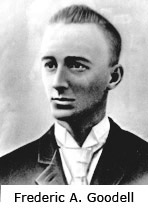
"In 1892 Albert D. Goodell moved to
Worcester, Massachusetts, accompanied by his family, and
there established the Goodell Tool Company in partnership
with his son, Frederick A. Goodell.(43)
Their
stay in Worcester was short but Albert D. still managed to work on
the design of two new tools and applied for patents. On December 27, 1892
the first patent was granted under
No. 488,691.
From the complexity
and broadness of this
design we can assume that Albert D. started work on this project some time
ago, probably still in Shelburne Falls. Here
is how he stated the objectives in the patent description:
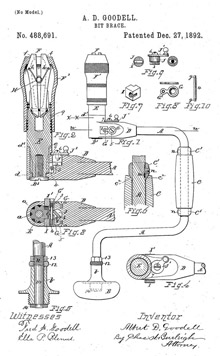 "The object of my present invention is to
provide a bit-stock or bit-brace in which the working joints
between the parts that rotate one against another can be
maintained in a condition for perfect operation, and to
provide facilities whereby any looseness of said joints due
to wear can be taken up by adjustment thereof. "The object of my present invention is to
provide a bit-stock or bit-brace in which the working joints
between the parts that rotate one against another can be
maintained in a condition for perfect operation, and to
provide facilities whereby any looseness of said joints due
to wear can be taken up by adjustment thereof.
Another object is to provide a bit-brace
with an improved reversing ratchet mechanism, simple and
efficient of operation, not liable to deterioration by use,
and which can be economically manufactured."
The information about the production of this
brace is very limited. The portion of this patent, a ratchet
mechanism, was incorporated by Goodell-Pratt Co. into a brace
they called Goodell-Hay Ratchet Brace with a Quick-Action Chuck.
It appeared in the 1905 Catalog No.
7.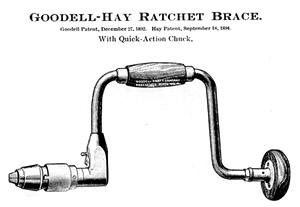
The design work
during Albert's stay in Worcester produced another tool – a
Combined Hinge-Gage and Square.
The
patent
No. 531,114 was issued on December 12, 1894, after Albert D.
and his son Frederick already moved back to Shelburne Falls.
The objectives for this design are stated in the
patent description, filed on October 9, 1893:
"The object of my present invention is to
provide a gage, adapted for use either as a hinge-gage or
mortise gage, which shall be light, convenient and efficient
for use; and also of such form and construction
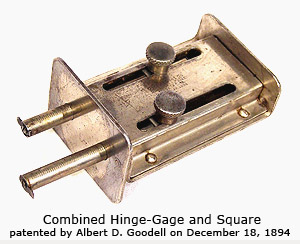 that it can
be used as a try-square for making the ends of mortises and
hinge recesses. that it can
be used as a try-square for making the ends of mortises and
hinge recesses.
Another object is to provide a hinge-gage
having facilities for adjustment whereby the relative
distances for the door and rabbet markings for the
hinge can be varied in relation to each other, as
explained."
Again,
William R. Cutter writes:
"In 1893 they removed their business to Shelburne
Falls, and rented the shop and power of H. H. Mayhew Company,
remaining until November, 1904, when they purchased the peg shop of J. R.
Foster, where they have continued up to the present time;
they are manufacturers of mechanics' tools, and their business
has been exceedingly prosperous."(44)
(39)
Biographical Review Publishing Company, Biographical Review - Biographical Sketches of the Leading
Citizens of Franklin County, Massachusetts. (Boston, MA,
1895), 326;
Cutter, William R.,
Genealogical and Personal Memoirs Relating to the Families of
the State of Massachusetts, Vol.3, (New York, 1910), 1666.
(40) Cutter, William R.,
Genealogical and Personal Memoirs Relating to the Families of
the State of Massachusetts, Vol.3, (New York, 1910), 1667.
(41) Machinery, June, 1915, Vol.21, (New York, 1915)
(42) ibid.
(43) Cutter, William R.,
Genealogical and Personal Memoirs Relating to the Families of
the State of Massachusetts, Vol.3, (New York, 1910), 1666;
Cope, Kenneth, Sorting out the Goodell
Companies, Chronicle of the Early American Industries
Association, v. 45, no. 4, (Levittown, NY, 1992), 115.
(44) Cutter, William R.,
Genealogical and Personal Memoirs Relating to the Families of
the State of Massachusetts, Vol.3, (New York, 1910), 1667.
|
|
|
|
|
 15 of 19
15 of 19
 |
|
|
|